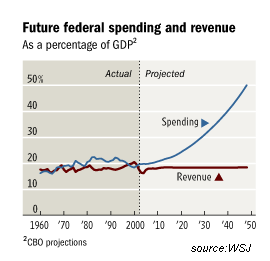

|
| weblog/wEssays | home | |
|
China and the U.S.: Circle of Self-Interest August 15, 2005 Americans often seem puzzled that various and sundry nation-states don't seem to act in accordance with our wishes--a view which is the very height of self-absorption. Why shouldn't every nation, group, family, clan and person act in their own self-interest? When Iran wants the leverage provided by nuclear weapons, for instance, and we want to deny them that leverage so that it can't be used on us or our allies, then the clash of interests is in sharp relief. Yet when things seem to go our way, as it has with China's industrialization and support of our low interest rates, then we imagine the world is working as it should. But what is actually happening is simply a virtuous circle of self-interest: the Chinese need to employ 400 million disenfranchised ex-farmers, and so expanding their industrial base at a breakneck pace is very deeply a matter of self-interest. (Never mind nagging details like pollution, peasant land rights or intellectual rights; there's no time for such hindrances.)  Additionally, they need to enable their largest customer base, the U.S. consumer, to continue to buy their
manufactured goods, and so pouring hundreds of billions of their trade-surplus dollars into U.S. Treasuries
is not an act of kindness ("Those poor Americans, unable to save a dime; let's help them out by keeping
mortgage rates at 40-year lows") but rank self-interest.
Additionally, they need to enable their largest customer base, the U.S. consumer, to continue to buy their
manufactured goods, and so pouring hundreds of billions of their trade-surplus dollars into U.S. Treasuries
is not an act of kindness ("Those poor Americans, unable to save a dime; let's help them out by keeping
mortgage rates at 40-year lows") but rank self-interest.
In a similar fashion, the redoubtable American consumer (if he or she is also a homeowner, which is about 70% of the population) looks at the enormous increase in their "real wealth" as reflected in their rising home equity and promptly reckons it's unnecessary to save any wages. And this makes perfect sense: why bother stashing away $500 a month in a savings account earning a paltry return when you've already "saved" $100,000 in the past few years via your increased home equity? Indeed, studies have shown that increases in home value make the owners "feel richer" and as a result they spend freely, confident in their growing wealth. The Federal Reserve, for it's part, is happy to flood the economy with liquidity, i.e. easy money, in order to keep the economy floating ever upward. (A sharp recession, after all, can ruin your whole day, not to mention your career.) The Fed raises short-term rates, but long-term rates (mortgages, etc.) are set not by the Fed but by the market--and so as long as the Japanese and Chinese central banks continue to buy U.S. bonds and keep mortgages cheap, then the American consumer will continue to spend lavishly on Japanese and Chinese-made goods. And so the circle of self-interest is complete--everybody's happy, except for a few malcontents who see the overloading of debt on the U.S. economy as the weight which will eventually sink the ship. But why can't the circle of self-interest continue indefinitely? Whay can't the Asian central banks support the U.S. consumer and reckless U.S. government borrowing forever? As long as American consumers continue shipping boatloads of dollars to Asian manufacturers, then the Asian banks will have to recycle that half-trillion dollars somewhere--and why not in safe, reliable U.S. Treasuries?  There is no magic here, and as a result there is no way to know when the circle will break, or what will cause
the various player's self-interest to diverge. But history suggests there will be a divergence, or an external
break in the circle, and then the vicious cycle of more expensive debt and falling home equities will replace
the virtuous circle of ever-cheaper money and ever-rising property values.
There is no magic here, and as a result there is no way to know when the circle will break, or what will cause
the various player's self-interest to diverge. But history suggests there will be a divergence, or an external
break in the circle, and then the vicious cycle of more expensive debt and falling home equities will replace
the virtuous circle of ever-cheaper money and ever-rising property values.
Cries of dismay will arise, but there will be no overseas saviors or Federal Reserve magic to mend the virtuous circle; gravity will exert its force on all those trillions of dollars of debt, and those with adjustable-rate or interest-only mortgages or other short-term debt--including Uncle Sam--will be the poorer for it. * * * copyright © 2005 Charles Hugh Smith. All rights reserved in all media. I would be honored if you linked this wEssay to your site, or printed a copy for your own use. * * * |
||
| weblog/wEssays | home |